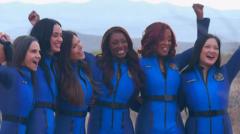The Blue Origin New Shepard rocket safely returned six female crew members to Earth after an 11-minute journey that sent them over 100 kilometers into space. Among the notable participants were singer Katy Perry, who captured attention with a performance of Louis Armstrong's "What a Wonderful World," and CBS anchor Gayle King, who expressed deep emotional gratitude upon landing.
Launching from a site in West Texas, the rocket offered moments of weightlessness to its passengers—who also included civil rights activist Amanda Nguyen, former NASA scientist Aisha Bowe, and film producer Kerianne Flynn. The mission, which intended to celebrate female empowerment in a male-dominated industry, garnered a mixed reception from the public and critics alike.
Public figures such as Khloé Kardashian and Oprah Winfrey witnessed the launch and expressed their own emotional reactions, showcasing the blend of celebrity culture with scientific achievement. Winfrey reflected on King's personal journey as a nervous flyer, highlighting the emotional significance of the flight for those involved.
While the event was celebrated as a milestone, it also sparked debate regarding the nature of space tourism, with critics like Dr. Kai-Uwe Schrogl expressing concerns that such ventures may prioritize entertainment over scientific exploration. This sentiment resonates among space scientists who feel sidelined by the media frenzy surrounding celebrity flights.
On social media, reactions ranged from admiration to admonition, with some users dubbing the event a "marketing stunt." Dr. Tanya Harrison commented on the potential shift in demographics for space tourism resulting from the all-female crew, suggesting that representation may inspire a new generation of aspiring astronauts.
In response to critiques regarding the costs associated with space tourism, King and Sánchez defended the mission's aims, emphasizing its positive impact on young women and girls. The flight's high ticket price, alongside its luxurious nature, raises questions about inclusivity in the industry, as critics pointed out the stark contrast between space tourism and everyday societal struggles.
Blue Origin, a company founded in 2000 by Jeff Bezos, has yet to reveal full ticket prices for its suborbital flights, but the financial barrier raises discussions about access to space. The environmental impact of such flights is another area of concern; experts warn that rocket emissions could adversely affect the atmosphere and ozone layer.
Despite these challenges, supporters argue that commercial space ventures can drive innovation and scientific collaboration, reinforcing a belief that humanity needs to expand beyond Earth. Professor Brian Cox remarked on the optimistic potential of partnerships between NASA and private enterprises.
As space tourism continues to develop, balancing sustainability, inclusivity, and scientific integrity will remain pivotal. The all-female spaceflight marks not just a unique achievement but also a moment of reflection on the future of human exploration beyond our planet.
Launching from a site in West Texas, the rocket offered moments of weightlessness to its passengers—who also included civil rights activist Amanda Nguyen, former NASA scientist Aisha Bowe, and film producer Kerianne Flynn. The mission, which intended to celebrate female empowerment in a male-dominated industry, garnered a mixed reception from the public and critics alike.
Public figures such as Khloé Kardashian and Oprah Winfrey witnessed the launch and expressed their own emotional reactions, showcasing the blend of celebrity culture with scientific achievement. Winfrey reflected on King's personal journey as a nervous flyer, highlighting the emotional significance of the flight for those involved.
While the event was celebrated as a milestone, it also sparked debate regarding the nature of space tourism, with critics like Dr. Kai-Uwe Schrogl expressing concerns that such ventures may prioritize entertainment over scientific exploration. This sentiment resonates among space scientists who feel sidelined by the media frenzy surrounding celebrity flights.
On social media, reactions ranged from admiration to admonition, with some users dubbing the event a "marketing stunt." Dr. Tanya Harrison commented on the potential shift in demographics for space tourism resulting from the all-female crew, suggesting that representation may inspire a new generation of aspiring astronauts.
In response to critiques regarding the costs associated with space tourism, King and Sánchez defended the mission's aims, emphasizing its positive impact on young women and girls. The flight's high ticket price, alongside its luxurious nature, raises questions about inclusivity in the industry, as critics pointed out the stark contrast between space tourism and everyday societal struggles.
Blue Origin, a company founded in 2000 by Jeff Bezos, has yet to reveal full ticket prices for its suborbital flights, but the financial barrier raises discussions about access to space. The environmental impact of such flights is another area of concern; experts warn that rocket emissions could adversely affect the atmosphere and ozone layer.
Despite these challenges, supporters argue that commercial space ventures can drive innovation and scientific collaboration, reinforcing a belief that humanity needs to expand beyond Earth. Professor Brian Cox remarked on the optimistic potential of partnerships between NASA and private enterprises.
As space tourism continues to develop, balancing sustainability, inclusivity, and scientific integrity will remain pivotal. The all-female spaceflight marks not just a unique achievement but also a moment of reflection on the future of human exploration beyond our planet.




















